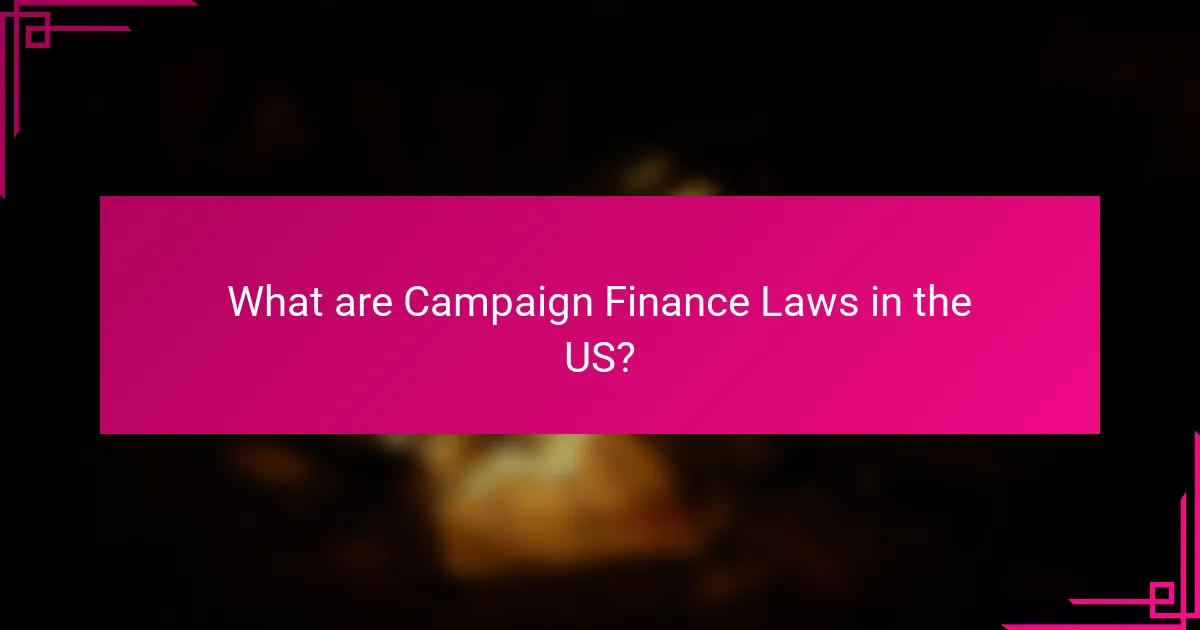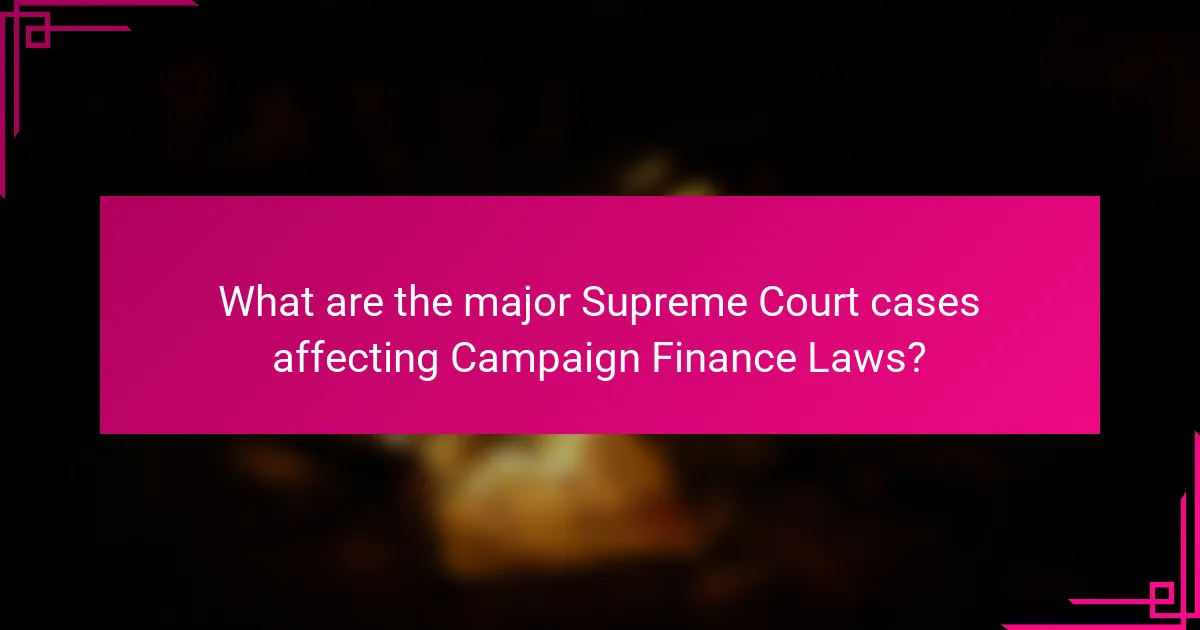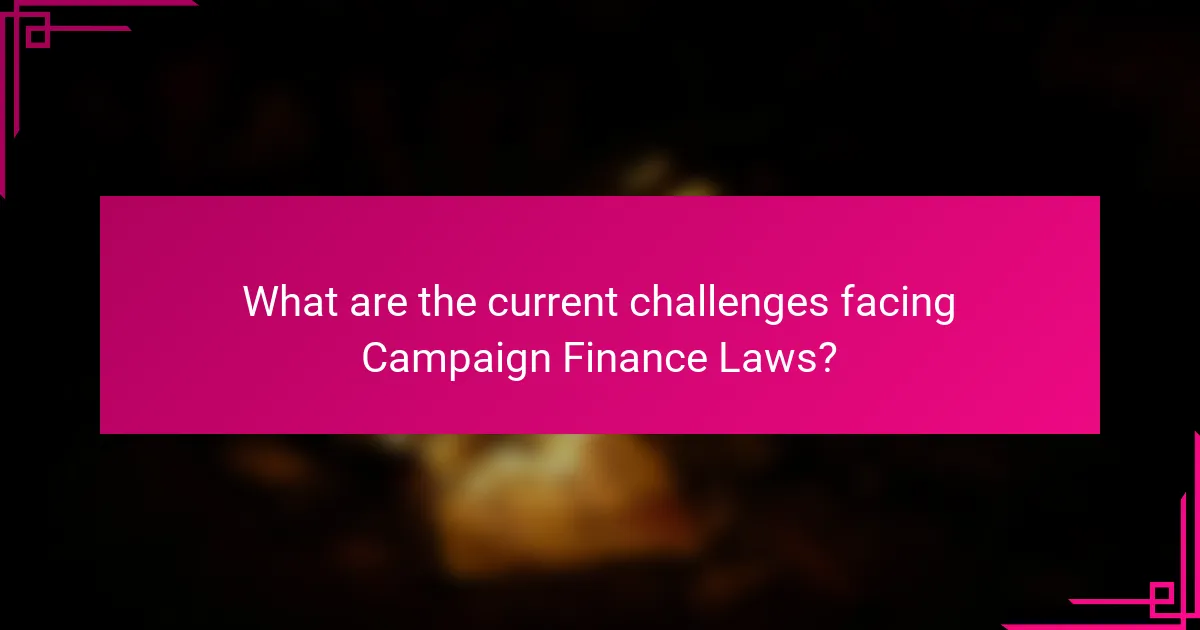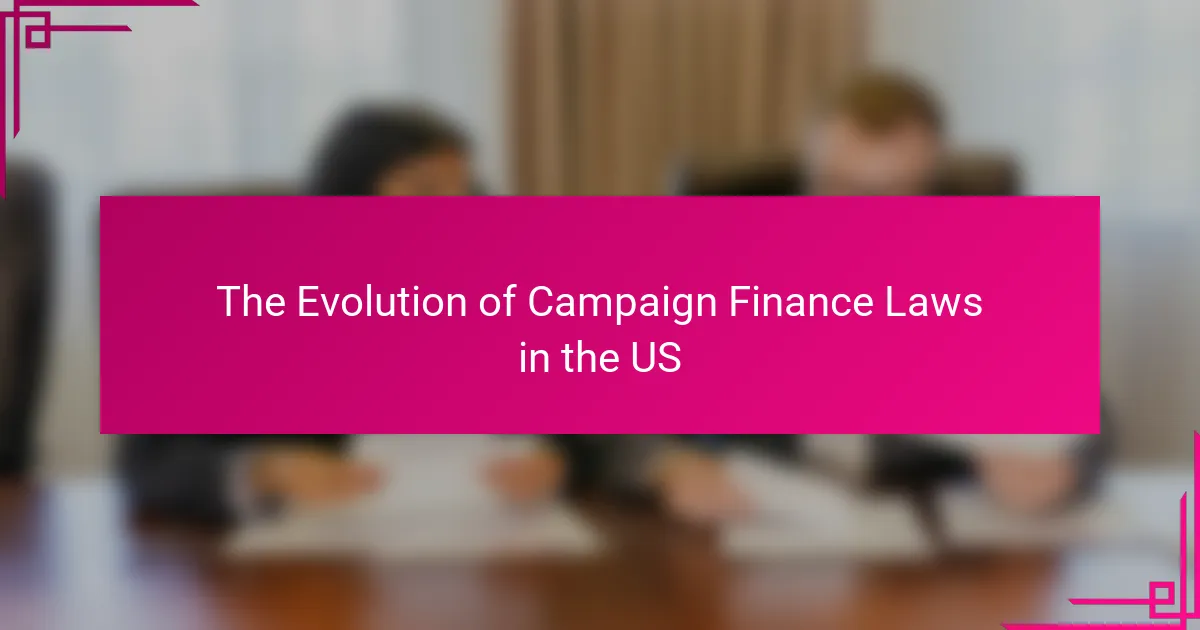Campaign finance laws in the United States regulate the financial contributions made to political campaigns, aiming to foster transparency and reduce corruption in the electoral process. These laws are enforced by the Federal Election Commission (FEC) and include significant legislation such as the Federal Election Campaign Act of 1971 and the Bipartisan Campaign Reform Act of 2002. Key Supreme Court cases, including Buckley v. Valeo, Citizens United v. FEC, and McCutcheon v. FEC, have shaped the interpretation and implementation of these laws, particularly regarding the influence of money in politics. Current challenges include the rise of dark money, the impact of Super PACs, and inconsistencies in state regulations, which complicate the landscape of campaign finance in the U.S.

What are Campaign Finance Laws in the US?
Campaign finance laws in the US regulate the funding of political campaigns. These laws aim to ensure transparency and limit corruption in the electoral process. They govern how much money individuals and organizations can contribute to candidates and political parties. The Federal Election Commission (FEC) enforces these laws at the federal level. Key legislation includes the Federal Election Campaign Act of 1971 and the Bipartisan Campaign Reform Act of 2002. Supreme Court decisions, such as Citizens United v. FEC, have significantly impacted these laws. The ruling allowed for unlimited independent expenditures by corporations and unions. Campaign finance laws vary by state, with some states imposing stricter regulations than federal laws.
How have Campaign Finance Laws developed over time?
Campaign finance laws in the US have evolved significantly since the early 20th century. Initially, the Federal Election Campaign Act of 1971 established regulations for campaign financing. This act aimed to increase transparency and limit contributions to candidates. In 1974, amendments were made to address concerns about spending limits and disclosure requirements. The Supreme Court’s 1976 Buckley v. Valeo decision ruled that spending money to influence elections is a form of protected speech under the First Amendment. This ruling led to increased spending by candidates and political action committees. In 2002, the Bipartisan Campaign Reform Act sought to restrict soft money contributions to national parties. However, the 2010 Citizens United v. FEC decision allowed corporations and unions to spend unlimited amounts on political campaigns. This ruling further transformed the landscape of campaign finance, leading to the rise of Super PACs. Overall, campaign finance laws have shifted from strict regulation to a system that permits significant financial influence in elections.
What historical events influenced the creation of Campaign Finance Laws?
The creation of Campaign Finance Laws in the US was influenced by several historical events. The 1907 Tillman Act prohibited corporate contributions to federal candidates. This act emerged in response to concerns over corporate influence in politics. The 1971 Federal Election Commission Act established the Federal Election Commission to regulate campaign finance. This law followed the Watergate scandal, which highlighted the need for transparency in political funding. The 2002 Bipartisan Campaign Reform Act aimed to eliminate soft money contributions to political parties. These events collectively shaped the framework of campaign finance regulation in the United States.
What key legislation has shaped Campaign Finance Laws?
The key legislation that has shaped Campaign Finance Laws includes the Federal Election Campaign Act (FECA) of 1971. This act established comprehensive regulations for campaign financing. It required candidates to disclose their campaign contributions and expenditures. The act was amended in 1974 to create the Federal Election Commission (FEC) for enforcement. Another significant piece of legislation is the Bipartisan Campaign Reform Act (BCRA) of 2002. The BCRA aimed to regulate soft money contributions to political parties. Additionally, the Supreme Court’s decision in Citizens United v. FEC (2010) significantly impacted campaign finance. This ruling allowed corporations and unions to spend unlimited amounts on political campaigns. Each of these legislative actions has fundamentally influenced the landscape of campaign finance in the United States.
Why are Campaign Finance Laws important for democracy?
Campaign finance laws are important for democracy because they help ensure fair elections. These laws regulate the amount of money that can be contributed to political campaigns. They aim to prevent corruption and the undue influence of wealthy individuals or organizations. By limiting contributions, these laws promote a level playing field for all candidates. This encourages diverse voices and ideas in the political arena. Historical evidence shows that nations with strict campaign finance laws tend to have higher voter trust and participation. For example, studies indicate that transparency in campaign financing leads to increased electoral integrity. Thus, campaign finance laws play a crucial role in maintaining democratic principles.
How do these laws impact political equality?
Campaign finance laws significantly impact political equality by regulating the influence of money in politics. These laws aim to create a level playing field for candidates. For instance, limits on contributions can prevent wealthier individuals from exerting disproportionate influence. In contrast, deregulation can lead to increased spending by affluent donors, skewing political representation. Studies show that states with stricter campaign finance laws tend to have more equitable electoral outcomes. Additionally, public financing options can enhance participation from candidates who lack substantial personal wealth. Therefore, the design and enforcement of these laws directly shape the degree of political equality within the electoral process.
What role do Campaign Finance Laws play in election integrity?
Campaign finance laws play a crucial role in ensuring election integrity. These laws regulate the amount of money that can be contributed to political campaigns. They also mandate transparency in campaign financing through disclosure requirements. By limiting contributions, these laws aim to reduce the influence of money on political decisions. This helps to prevent corruption and maintain public trust in the electoral process. For example, the Federal Election Commission enforces limits on individual contributions to candidates. Studies have shown that stronger campaign finance laws correlate with higher levels of voter trust in elections. Overall, these regulations are essential for safeguarding democratic processes.

What are the major Supreme Court cases affecting Campaign Finance Laws?
The major Supreme Court cases affecting campaign finance laws include Buckley v. Valeo, Citizens United v. FEC, and McCutcheon v. FEC. Buckley v. Valeo (1976) established that spending money to influence elections is a form of protected speech under the First Amendment. This case also differentiated between individual contributions to candidates and independent expenditures. Citizens United v. FEC (2010) ruled that corporations and unions can spend unlimited funds on political campaigns, reinforcing the notion that money equals speech. McCutcheon v. FEC (2014) struck down aggregate contribution limits, allowing individuals to contribute to as many candidates as they wish. These cases collectively shaped the landscape of campaign finance in the United States.
How did Buckley v. Valeo shape modern Campaign Finance?
Buckley v. Valeo established that spending money to influence elections is a form of protected free speech under the First Amendment. This ruling significantly altered the landscape of campaign finance by striking down limits on individual contributions to political campaigns. However, it upheld limits on contributions to candidates to prevent corruption. The decision led to the emergence of independent expenditures by individuals and organizations, allowing them to spend unlimited amounts on political advocacy. As a result, this case paved the way for the rise of Super PACs and increased spending in elections. The ruling has been cited in subsequent cases, reinforcing the idea that money equals speech. Overall, Buckley v. Valeo fundamentally shaped modern campaign finance by prioritizing free speech over regulatory limits.
What were the implications of the decision in Buckley v. Valeo?
The implications of the decision in Buckley v. Valeo were significant for campaign finance laws. The Supreme Court ruled that spending money to influence elections is a form of protected free speech under the First Amendment. This decision invalidated limits on independent expenditures by individuals and groups. It distinguished between contributions to candidates and independent spending. The ruling allowed for greater financial influence in elections. It led to the rise of Political Action Committees (PACs) and increased fundraising efforts. Consequently, this decision shaped the landscape of campaign finance in the United States. The case remains a pivotal point in discussions about money’s role in politics.
How did this case redefine the concept of political spending?
The case redefined the concept of political spending by establishing that spending money to influence elections is a form of protected free speech under the First Amendment. This ruling allowed corporations and unions to spend unlimited amounts on political campaigns. Prior to this case, such expenditures were restricted by law. The decision emphasized that financial contributions do not equate to corruption. It shifted the landscape of campaign finance, leading to an increase in outside spending and super PACs. This transformation has significantly impacted how elections are funded in the United States.
What impact did Citizens United v. FEC have on Campaign Finance?
Citizens United v. FEC significantly impacted campaign finance by allowing unlimited independent spending by corporations and unions. The Supreme Court ruled that political spending is a form of protected speech under the First Amendment. This decision led to the rise of Super PACs, which can raise and spend unlimited amounts of money. As a result, the influence of money in politics increased dramatically. In 2012, Super PACs spent over $1 billion in the presidential election. The ruling altered the landscape of campaign financing, enabling wealthy donors to have a larger impact on elections. Overall, Citizens United v. FEC reshaped the regulatory framework governing campaign finance in the United States.
What changes did Citizens United introduce to political spending?
Citizens United v. Federal Election Commission introduced significant changes to political spending. The Supreme Court’s 2010 ruling allowed corporations and unions to spend unlimited funds on independent political expenditures. This decision effectively equated money with free speech under the First Amendment. As a result, organizations could now influence elections without restrictions on spending. The ruling led to the rise of Super PACs, which can raise and spend unlimited amounts of money. These changes have dramatically altered the landscape of campaign finance in the United States. The decision has been linked to increased political advertising and the growing influence of money in politics.
How has Citizens United affected the role of Super PACs?
Citizens United v. FEC significantly expanded the role of Super PACs in U.S. elections. The Supreme Court ruling in 2010 allowed corporations and unions to spend unlimited amounts on independent political expenditures. This decision led to the creation and proliferation of Super PACs, which can raise and spend unlimited funds to advocate for or against political candidates. Super PACs operate independently from candidates’ campaigns, which means they can influence elections without direct coordination. As a result, Super PACs have become key players in election cycles, often outspending traditional campaign committees. In the 2012 election cycle, Super PACs raised over $1 billion, illustrating their substantial impact on campaign finance.

What are the current challenges facing Campaign Finance Laws?
Current challenges facing Campaign Finance Laws include the influence of dark money in elections. Dark money refers to political spending by organizations that are not required to disclose their donors. This lack of transparency undermines public trust in the electoral process. Additionally, the rise of Super PACs has led to increased spending by wealthy individuals and corporations. Super PACs can raise unlimited funds, which can distort the democratic process. Another challenge is the inconsistency in state laws regarding campaign finance. Each state has different regulations, creating confusion and potential loopholes. Finally, the Supreme Court’s decisions, particularly in Citizens United v. FEC, have complicated efforts to regulate campaign finance. This ruling allowed for unlimited corporate spending in elections, further entrenching the influence of money in politics.
How do loopholes in Campaign Finance Laws affect elections?
Loopholes in campaign finance laws significantly affect elections by allowing unlimited contributions from certain entities. These loopholes create an uneven playing field among candidates. Wealthy individuals and corporations can exert disproportionate influence on election outcomes. For example, Super PACs can raise and spend unlimited amounts of money, often without disclosing their donors. This lack of transparency undermines public trust in the electoral process. Studies indicate that candidates with more financial backing from these sources often win elections. In the 2016 presidential election, for instance, Super PACs spent over $1 billion, heavily favoring specific candidates. Thus, loopholes in campaign finance laws fundamentally alter the dynamics of electoral competition.
What are some examples of loopholes that have been exploited?
Super PACs are a notable example of exploited loopholes in campaign finance laws. They allow unlimited contributions from individuals and corporations. This was made possible by the 2010 Supreme Court decision in Citizens United v. FEC. The ruling stated that political spending is a form of protected speech. As a result, Super PACs can raise and spend money without direct coordination with candidates. Another example is the use of 501(c)(4) organizations. These nonprofit entities can engage in political activity without disclosing donors. This has led to anonymous funding of political campaigns. Additionally, bundling is a tactic where multiple contributions are gathered to circumvent limits. These practices highlight significant gaps in the regulatory framework of campaign finance.
How can these loopholes undermine the legislative intent?
Loopholes can undermine legislative intent by allowing entities to bypass regulations designed to ensure transparency and fairness in campaign financing. For instance, these loopholes may enable corporations and individuals to make unlimited contributions through indirect channels. This circumvention can lead to a disproportionate influence of money in politics, contrary to the original aim of leveling the playing field for all candidates. Additionally, loopholes may obscure the true sources of campaign funding, reducing accountability and public trust. Studies have shown that when financial contributions are not adequately disclosed, voters have less information to make informed decisions. This ultimately dilutes the effectiveness of laws intended to regulate campaign finance and protect democratic processes.
What reforms are being proposed to improve Campaign Finance Laws?
Proposed reforms to improve Campaign Finance Laws include increasing transparency in political donations. This would require organizations to disclose major donors and their contributions. Another reform suggests implementing stricter limits on individual donations to candidates. Additionally, proposals advocate for public financing of campaigns to reduce reliance on large donations. Some reforms aim to close loopholes that allow dark money to influence elections. These changes are intended to promote fairer electoral competition and reduce corruption. Recent studies show that increased transparency leads to greater public trust in the electoral process.
What strategies are being suggested to enhance transparency?
Strategies to enhance transparency in campaign finance include implementing stricter disclosure requirements. These requirements mandate that organizations disclose their donors and expenditures. Additionally, real-time reporting of campaign contributions is suggested. This allows for immediate public access to financial information. Establishing independent oversight bodies can also improve transparency. These bodies would monitor compliance with finance laws. Public financing of campaigns is another proposed strategy. It reduces reliance on private donations and increases accountability. Lastly, promoting the use of technology for tracking donations can enhance visibility. These strategies aim to create a more open and accountable campaign finance system.
How can public financing of campaigns address current issues?
Public financing of campaigns can address current issues by reducing the influence of wealthy donors. It promotes a more equitable political landscape by allowing candidates to focus on voters rather than fundraising. Public financing can increase voter engagement by making elections more competitive. A study by the Brennan Center for Justice showed that states with public financing have higher voter turnout. This system helps to counteract the negative impacts of money in politics. It encourages diverse candidates to run for office, improving representation. Furthermore, public financing can lead to policy discussions that reflect the needs of the general public. Overall, it aims to create a fairer electoral process.
What can individuals do to engage with Campaign Finance Laws?
Individuals can engage with Campaign Finance Laws by educating themselves about the regulations. They should review resources from organizations like the Federal Election Commission (FEC). Individuals can also participate in public comment periods for proposed regulations. Attending local government meetings can provide insights into campaign finance discussions. Volunteering for advocacy groups can amplify their voice on these issues. Additionally, individuals can contribute to campaigns that align with their values, ensuring transparency. Tracking campaign finance reports helps individuals understand funding sources. Engaging with representatives about campaign finance reform can influence policy changes.
The main entity of the article is Campaign Finance Laws in the US. The article provides a comprehensive overview of the evolution, significance, and challenges of these laws, detailing key legislation such as the Federal Election Campaign Act and the Bipartisan Campaign Reform Act, as well as landmark Supreme Court cases like Buckley v. Valeo and Citizens United v. FEC. It explores the impact of campaign finance laws on democracy, political equality, and election integrity, while also addressing current issues such as dark money and proposed reforms aimed at increasing transparency and reducing the influence of wealth in politics. Overall, the article highlights the critical role that campaign finance laws play in shaping the electoral landscape in the United States.
